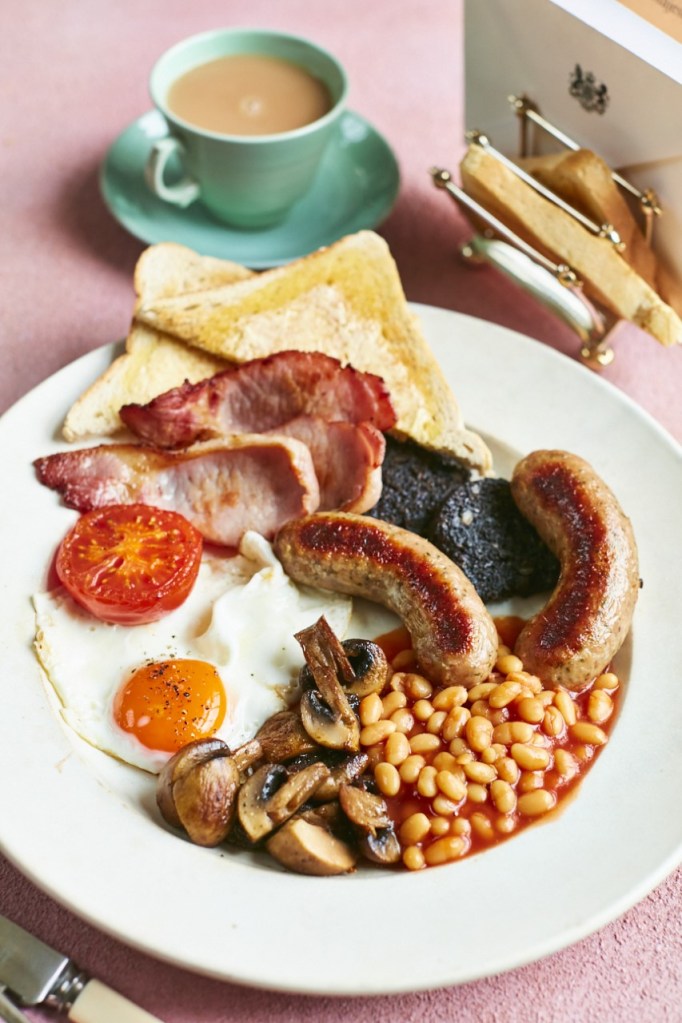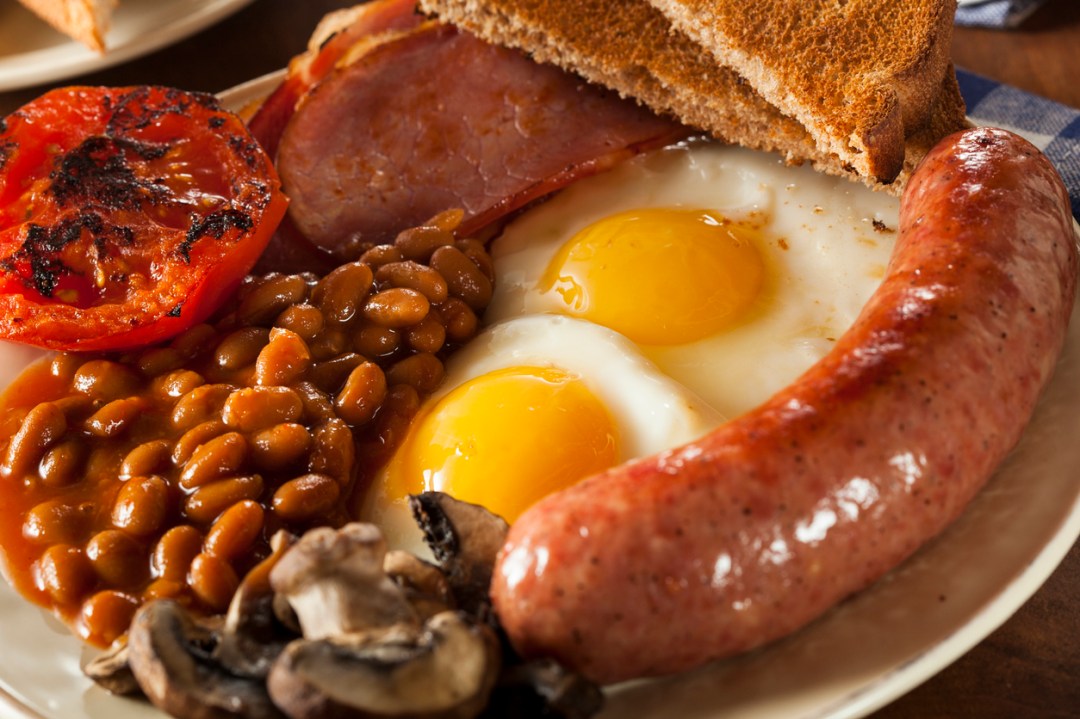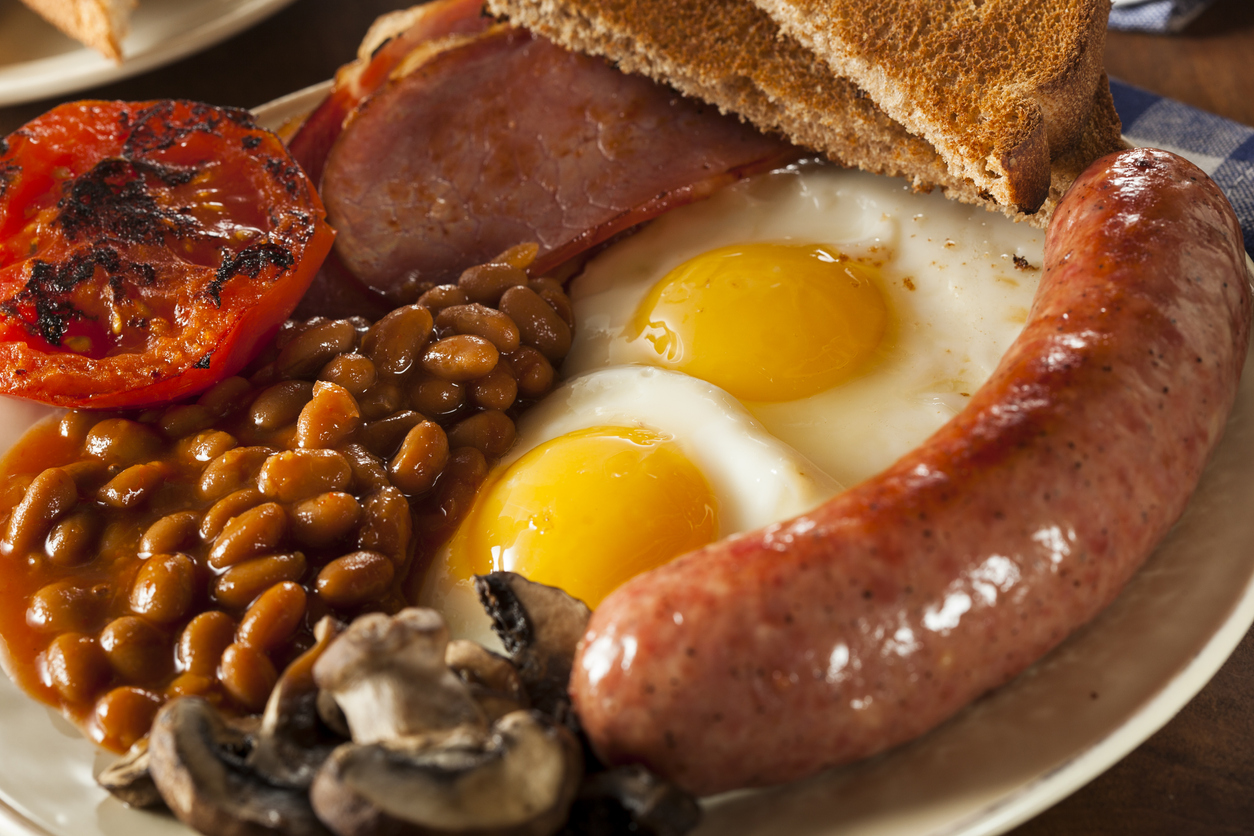The British playwright Somerset Maugham once said that ‘to eat well in England you should eat breakfast three times a day’. I think he meant it as a jibe, but we should take it as a compliment.
Our breakfast is as powerfully evocative of England as any part of our cultural heritage. In The Lion and the Unicorn, stirred to patriotism amid the country’s daily bombardment in the Blitz, George Orwell opined that English civilisation was ‘somehow bound up with solid breakfasts and gloomy Sundays, smoky towns and winding roads, green fields and red pillar-boxes. It has a flavour of its own’. That flavour is of sizzling bacon, straight from the pan.
Rare is the Englishman who doesn’t have strong views on how they like it: toasted bread or fried? Mushrooms or tomatoes? Fried egg or scrambled? Ketchup or HP sauce?
Our beloved breakfast has been the subject of a serious work of anthropology in Kaori O’Connor’s The English Breakfast in which she declares it to be the most famous national meal in the world. Originally a dish of the wealthy, popular in the country houses of the gentry as early as the 13th century, the full English’s heyday lasted from around the accession of Queen Victoria to the early 1950s. Its appeal to urban dwellers lay partly in its wholesome recollection of the country home, and this was an important factor in its popularity in the industrial era. As O’Connor has pointed out: ‘By recreating the idealised country lifestyle in town, the English breakfast helped to mitigate the perceived ills of urbanisation.’
It has not been all plain sailing for the fry-up. In the 1920s the growing taste for all things modern and American (especially packaged cereals, sold as health foods so women would not feel guilty about serving them to their families) made the English breakfast seem old-fashioned. Today, the greatest threat is surely the vogue for ostensibly greener and healthier eating.
What is it about the full English that is so special? Partly it is its heartiness. Set against the daintiness of the continental breakfast, there is something suitably gutsy about it. Proper fuel for a working man’s day. It is meaty and eggy and carby and fatty. There is piquancy from the condiments and moistness from the beans. Tick tick tick. And then there is its ease of cooking: French viennoiserie is all very well on occasion at a proper bakery that know their chausson aux pommes from their pain aux raisins. But at a Wetherspoons or a motorway service station, give me a full English every time.

There are some essential elements. A YouGov poll in England in 2017 revealed the single most important component of a full English was bacon, with 89 per cent deeming it essential. Next in order of importance came sausage (82 per cent), toast (73 per cent), beans (71 per cent), fried egg (65 per cent) and hash browns (60 per cent). (Some confused souls – 6 per cent of those surveyed – inexplicably thought pancakes should be on the plate.) There are also of course the devolved breakfasts: the Scottish, Welsh and Irish variations which include the likes of haggis, white pudding and laverbread.
It is the space for subtle variations that is one of the joys of the fry-up. Rare is the Englishman who doesn’t have strong views on how they like it: toasted bread or fried? Mushrooms or stewed tomatoes? Black pudding or hash browns? Fried egg or scrambled? Ketchup or HP sauce? One each of sausage and bacon rasher, or three? Herein are the deliberations that make us who we are.
Each ingredient requires proper attention. The fat on the bacon – whether back or streaky – should be properly rendered. The mushrooms should be cooked in butter. The baked beans, to my mind, should be Heinz. There is also the not insignificant matter of how it all should be arranged on the plate. The beans pose a particular challenge. Alan Partridge advocated using the sausage ‘as a breakwater’ between eggs and beans to avoid unintentional mixing. The toast should ideally be positioned on the rim of the plate or even in a separate toast rack to avoid sogginess. I could go on.
Francis Bacon (who it feels fitting to quote here) once said that: ‘Hope is a good breakfast, but it is a bad supper.’ I would turn his insight on its head and suggest that a good breakfast fills one with hope while a bad supper is, well, just a bad supper. English Breakfast Day is today. Do your duty.







Comments